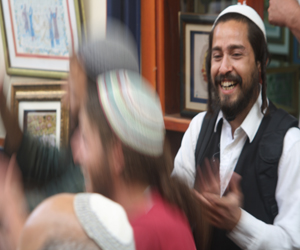Magical Music
The genre of music known as klezmer, received its name only in the 1970's when this Jewish soul music enjoyed renewed popularity. The term klezmer was coined from two Hebrew words: "kley" meaning vessel or tool, and, "zemer" meaning tune or song. In Hebrew, the term "kley zemer" refers to musical instruments, but during the mid 17th century, a musician began to be referred to as a klezmer, and the plural form became "klezmorim." Only during the resurgence in popularity of this music in the 20th century did the term come to connote a certain musical style.
Celebratory Music
Klezmer is the sound of the celebratory music the Eastern European, Yiddish-speaking Jews played at their special occasions, such as weddings. An overview of Jewish history and in particular, Eastern European Jewish history is therefore essential to understanding klezmer music.
Levite Tribe
As far back as biblical times, music was interwoven into Jewish religious practices. The Levite tribe was responsible for providing music during services held at the Temple. It was believed that music had the magical power to heal the soul and psyche, elevate the spirit, and create miracles. The bible makes mention of several types of musical instruments and the psalms contains certain musical notations, though the texts fall short of giving us an idea of the sound of the music which was played in the Temple.
The destruction of the First Temple led to the exile of the Jews from Jerusalem to Babylon, today's Iraq. Once the exile ended, many Jews decided to stay on while some moved toward the north and into Central Asia. Those who returned to Jerusalem rebuilt the temple which was again destroyed in 70 CE by the Romans. This caused the general dispersion of the Jews, known as the Diaspora. The Jews settled throughout Europe and North Africa.
The Diaspora is a crucial event for the history of klezmer because the tragic event that was the destruction of the Temple led to certain Jewish musical traditions. The Jews were instructed not to listen to instrumental music so as to express their mourning for the Temple. Such mourning could only end once the Messiah arrives and the Temple is rebuilt. To this day, many religious Jews living in Jerusalem have the custom of not listening to instrumental music while in the holy city, though many hold weddings outside of Jerusalem where the custom permits instrumental music.
Unaccompanied Singing
It is due to this prohibition that Orthodox services permit only unaccompanied singing. The high status of the Levites as Temple musicians evolved into something more symbolic. Secular music came to be thought of as representing the decadence of Greek culture that surrounded the Jews in the Diaspora.
Jumping ahead, by the 9th century, many Jews had settled in Eastern Germany, called Ashkenaz. From there, the Jews moved further east into what is now Poland and beyond. From this time, the Jews connected to this migration as well as their descendants came to be called Ashkenazim, spoke the combination of medieval German, Hebrew, and Slavic known as Yiddish which is written with Hebrew characters, and kept Ashkenazi-specific religious customs and observances, and it was out of this culture that klezmer music found its roots.

